Creating a fully stocked home apothecary with all the essentials you may need means you will be well prepared to make any herbal or home remedy.
This post may contain affiliate links at no additional cost to you. By making your purchases through the links on this website, IMSL may make a small percentage at no direct cost to you. IMSL only promotes products we use & truly believe in. Please refer to my Privacy & Disclosures for further information. IMSL thanks you for your support!
For many years I have been interested in learning, experimenting, and creating our own herbal & home remedies. Somewhat of a kitchen witch if you will.
Although not certified & certainly not a master herbalist, with almost 20 years experience & research under my belt, I am still learning. The knowledge I have acquired allows me to create our own home holistic treatments with some confidence.
When first beginning, research & self-education is key to staying safe. It’s important to remember that just because you can grow it or wild-craft it yourself does not mean it’s safe. There are many plants & plant parts that can be dangerous & toxic. Some even downright poisonous to use & even work with for some.
So educate, research, and talk with local herbalists when starting out. Check the credentials and/or experience of those that are offering you their advice. A few of my favorite reads are…
- Herbal Medicine For Beginners by Rosemary Gladstar
- Rosemary Gladstars Herbal Recipes For Vibrant Health
- Rodales Illustrated Encyclopedia Of Herbs
- The Way Of Herbs by Michael Tierra
- The Gift of Healing Herbs by Robin Rose Bennett
One of the best ways to learn this home art is through the courses offered by the Herbal Academy.
Their introductory course offers a firm base of knowledge that will allow you to begin confidently creating safe home remedies that work for you and your family.
How to create your own “materia medica” (a complete article on exactly what that is & why you should create one coming soon) and further recommended readings to expand your knowledge base are also included in this course. For more information, click the image below.

DEFINITION OF A HOME APOTHECARY
What exactly is considered a home apothecary? The word “apothecary” itself refers to “storage”. Storage used for preservation, access, and creation. For me it’s my wellness cupboard.
A cupboard filled with natural, good for you ingredients that I use to create my botanically based concoctions. A spot that I can safely store herbs that I’ve grown, harvested, and dried (best when stored away from heat & light), and any tinctures, elixirs, infusions, & oils that I’ve created.
Anybody who is interested in creating their own home apothecary has an idea of what their home apothecary should look like. I feel it is largely dependent on aesthetic taste, finances, and space.
My home apothecary is made up largely of the re-purposed, have on hand containers. Would I love to have beautiful matching containers? Yes. Am I going to spend the money on these? No. That’s not to say that I can’t gaze lovingly on the images of those who do.
Should you be able to afford that, I say yes! And that I’m just a bit envious of it 😉
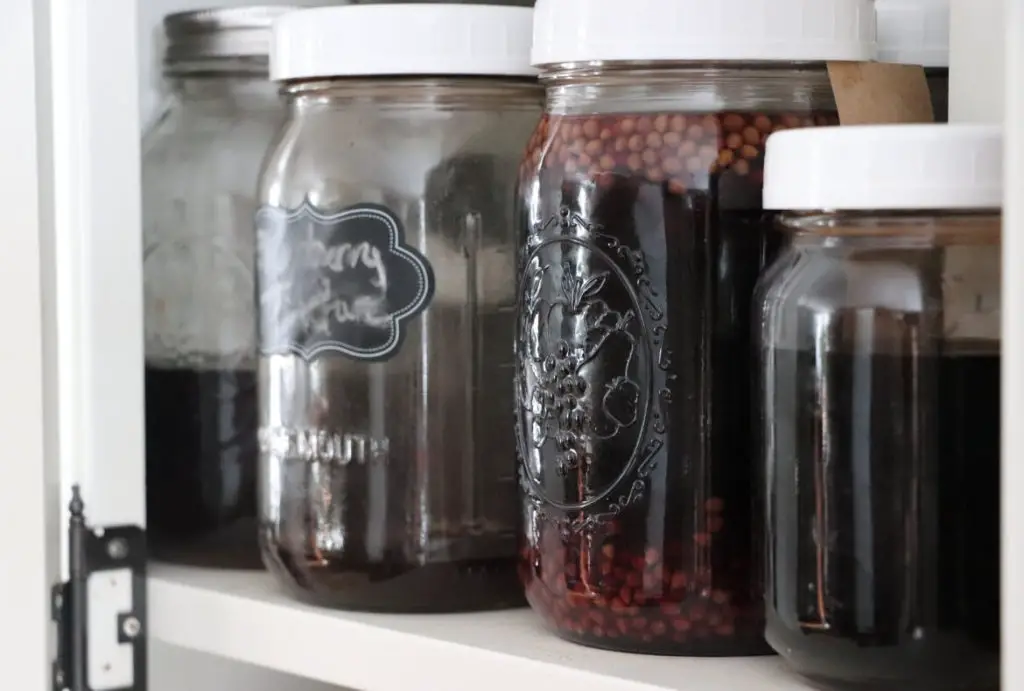
I will say, my cupboard needs some organizing! Writing this has inspired me to get off my hiney and get organizing! Make sure your view the before and after photo & video tour found below, on my home apothecary (hopefully, it will look and function better than when I began, lol!).
WHAT ESSENTIALS ARE IN THE HOME APOTHECARY
Nothing is more frustrating than making a recipe and not having enough of an ingredient or the right tool to be able to complete it. I’ve created this list of home apothecary essentials to hopefully help mitigate just that for you!
The good news? With a bit of creativity, you most likely have much of what you may need on hand already 😉
There are 3 components that make up my home apothecary. All make organizing & using this space more functional.
- Essentials
- Equipment
- Herbs & Ingredients
Let’s take an in-depth look at each.
HOME APOTHECARY ESSENTIALS
What is considered an “essential” in the home apothecary? For me, it’s something that you cannot do without. It’s something that makes your task a bit more organized & easier. Many of these “essentials” are free & just take a bit of time.
ORGANIZATION – If there is nothing else you take from this article it’s this. When creating your own home apothecary organization is key. There may be nothing worse than creating an herbal formula that you love & works amazingly and not have it properly labeled or can’t find it because it’s been stored in the back of a dusty old space that’s unused.
Even now, I fall into old habits of “I’ll just throw this in there & get to it later”. Well, later comes really late & oftentimes never, just sayin’ 😉
Below is my cupboard just prior to writing this. So I thank you for inspiring me to get going and get organized!
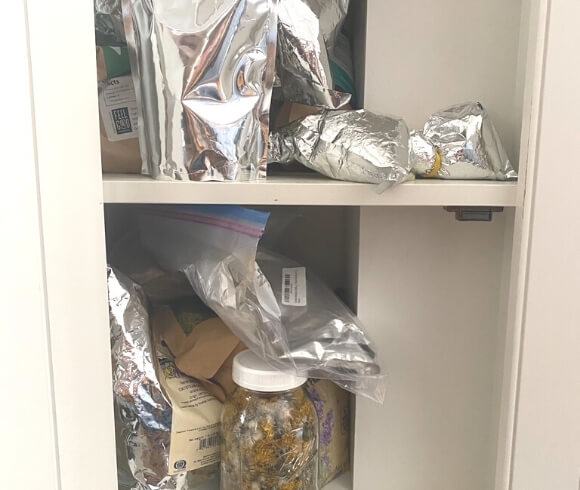
By organizing, alphabetizing, labeling with the ingredients & the amounts used, and the date it was created, you will be sure to find exactly what it is you are searching for. Trust me, been there done that 😉
STORAGE – You don’t need anything fancy or need to purchase anything additional other than what you have available. I am not speaking about containers here. By storage, I mean a place. A place to store, organize, & find your product(s) easily.
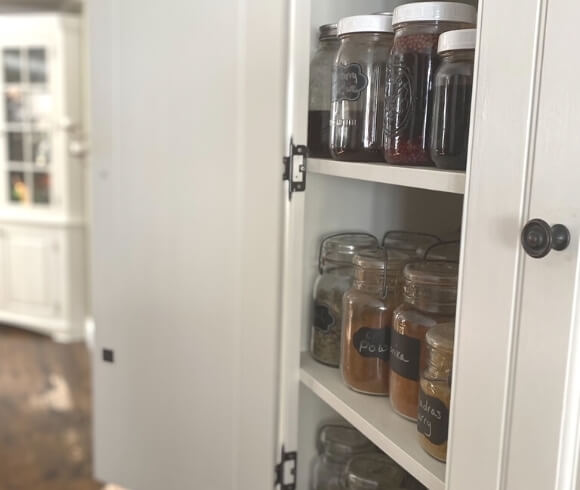
I see many apothecary spaces that have been created utilizing open shelves. They look beautiful. They function & are easily accessible. But from a practical point of view here are my thoughts.
- PROPER HERB STORAGE – When it comes to proper storing of your dried herbs, light, air, & heat are the enemy. Herbs should be stored in a sealed container (no air-flow once dried), away from sunlight, and away from any heat source. My preference? A cupboard.
- TYPE OF CUPBOARD – With proper storage of herbs in practice, there is one item on my wish list that due to space confinements I was not able to incorporate into our home presently. Should you be creating a space or cupboard especially for your storage needs, consider shallow shelves. Shelves that hold only one container deep. As you can see I have had to place mine 3 containers deep which makes it a bit more challenging to easily grab what it is you need. At least it’s alphabetical making it easier to locate a jar. A one jar grab & go type storage would be ideal.
- CLEANLINESS – Practicality tells me once again that while open shelves are pretty, they get dirty. Being someone who is not a fan of cleaning, having to clean 30+ jars & the shelves they sit on are not my idea of fun. Especially during the winter months while heating with wood, just sayin’ 🙂
EQUIPMENT FOR THE HOME APOTHECARY
There are a few tools or pieces of equipment that make using my home apothecary function more easily.
MEZZALUNA BOARD & KNIFE – This curved cutting board & cutting knife makes quick work of cutting through tough roots & herbs. I use this especially when cutting valerian root & echinacea root that I’ve grown & harvested.
TRADITIONAL MOLCAJETE – An authentic Mexican molcajete works amazingly for grinding & powdering those dried herbs. Should you have a traditional mortar & pestle on hand, perfect!
Why do I like the heavier molcajete versions? Because they don’t move around. They are heavy!
There is something to be said by connecting to the herbs energies when working with them. Through the use of physically grinding my own seed pods, stems, flowers, and leaves, I establish this strong, energetic connection with what it is I’m working on. I feel that this loving energy is then transferred to the product that I’m creating.
NOTE: Some prefer to use a coffee grinder designated just for herb grinding. I feel these work wonderfully when a powdered form of the herb is needed (filling your own capsules etc). However, for many other applications, the herbs can be a bit too powdery.
DEHYDRATOR – Although not completely necessary, after all with a little planning you can use the power of sun and air to dry your ingredients. However, the dehydrator sure does make quick work of it. A quality dehydrator is a workhorse put to good use in any home apothecary.
STORAGE CONTAINERS – This is where you can certainly get creative. Looking for sustainable storage? Think recycled glass containers with lids. You want to be able to see what’s inside easily. Whatever type of storage you settle on, I find that by using roughly the same shaped containers makes for easier placement in your cupboard.
My favorites are repurposing antique mason jars with glass lids. They just bring me joy 🙂
Having various sizes available is always a good idea. I typcially use standard mason jars when creating my tinctures, oils, & herbal infusions, but smaller specialty sizes are always a benefit to have available.
LABELS – If you think you will remember what’s been stored in your jar down the road, your wrong. I can’t tell you how many times I think, “Oh, I’ll know what this is”, only to pick the jar up and not have the foggiest idea.
Lesson learned. Label it. Label with the product, the ingredients, how much of each is used if applicable, and the date is was created or stored in the jar. You can thank me later 😉
Now when it comes to labeling you have lots of choices. I’ve used everything from writing directly on the jar or lid with a sharpie (this washes off easily if you want to change what’s being stored), to pretty antique labels (chalkboard style), to simply using painters tape (again, this easily is removeable when you need it to be).
The choices are wide & varied. Finding what works best for you at times is simply by experimenting.
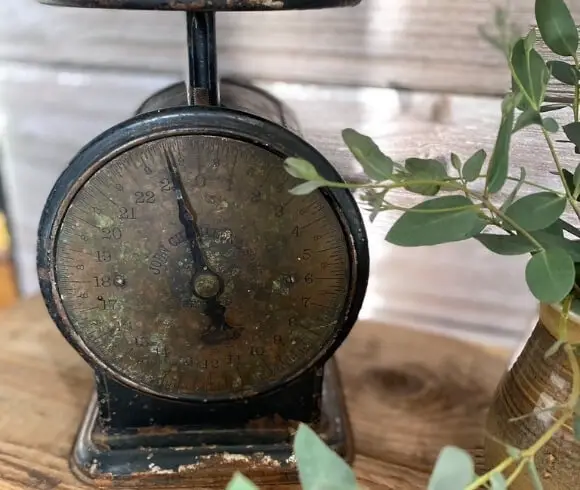
SCALE – When it comes to preparing your remedies, teas, or salves, you will want to have a kitchen scale. Either an analog type scale or a digital will work. I have both that I use depending on what I’m weighing.
However, I tend to prefer the digital scales as I can adjust the weight into fractions of ounces should I need.
DOUBLE BOILER – A double boiler will come in handy especially when creating your own salves & balms. No need to purchase one (unless you really would like to) as you can create your own system using a bowl that fits snuggly atop a sauce pan.
AMBER TINTED GLASS BOTTLES – Once you being making your own tinctures & concoctions you may want to invest in a few amber colored glass bottles for storage. They come in all sizes, shapes, & tops.
I typically use the 1-2 oz size with a dropper top most frequently. These amber colored bottles are not only convenient for storing your creations, but they also are an added protection for your product, by protecting the product from any denaturing that may occur due to light exposure.
MISCELLANEOUS KITCHEN WEARS – Other kitchen essentials may be needed. A good cheesecloth, I found a reusable one that I’m using continually (link below), fine mesh strainer, funnels in appropriate sizes, and mixing bowls with a pouring spouts (I use my Pyrex measuring bowls).
MUST HAVE HERBS & INGREDIENTS
What would any home apothecary be without the good stuff lining your shelves. The home-grown, organic goodness that falls under the umbrella of herbs.
Whether you grow or wild-craft your own medicinal & culinary herbs or not, you will need to stock those shelves with a few must have’s as well as some additional “ingredients”.
HOME APOTHOCARY MUST HAVE INGREDIENTS
SPIRITS – No not the invisible, ghostly kind silly. The kind we pour into a glass once in a while 😉 Well, I do anyway. One of the most popular & easy ways to create tinctures is by utilizing at least 80 Proof alcohol. Although there are other ways of creating your tinctures (glycerin for one), making them with alcohol is my preferred method.
My favorite alcohol for general tincture making? Vodka. Why? It’s pretty tasteless, relatively reasonable in cost & does a fine job of extracting the herbal qualities we are looking for in a tincture.
SPICES – Yes you heard correctly. A few spices I find indespensible in my home apothecary include whole cloves, ground ginger, & cinnamon sticks to name just a few.
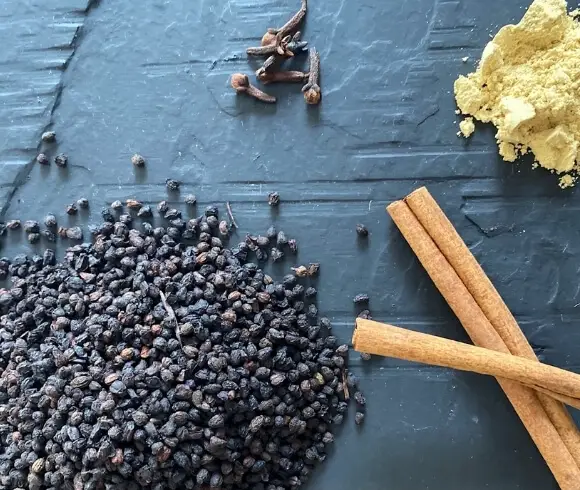
RAW HONEY – The many uses for honey, both medicinally & culinary, are widely known. Take a peak at the image I created below listing many of its attributes. Using honey in the creations coming from your apothecary make sourcing raw honey invaluable.
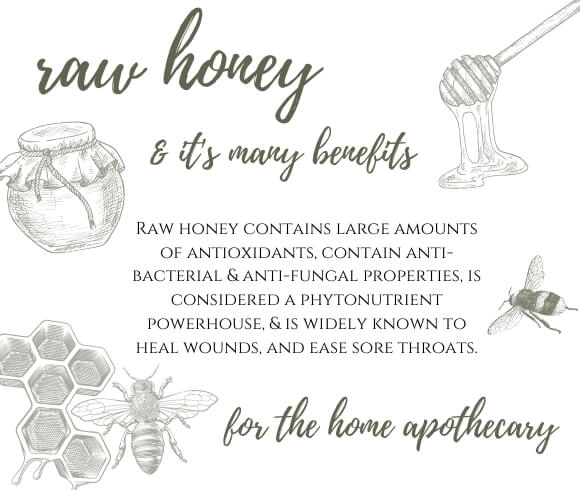
I am fortunate that I just have to step out my front door to source our own raw honey. The closer to home you can source yours, the better, as it will contain the pollen of what’s closest to you.
To find your local raw honey sources, look to farmers markets, herbal stores, and even some local markets.
One of my favorite uses for my raw honey? Making my own “Honey Fermented Garlic”. A must make each year to have on hand during the colder months.
Although it’s advised not give honey of any kind to children under the age of 1, honey is a home apothecary essential must have.

VINEGAR – Having raw apple cider vinegar or even apple scrap vinegar with the mother that you have created yourself on hand makes for a wonderful addition to syrups & can even be used in lieu of alcohol when making tinctures.
ESSENTIAL OILS – Why essential oils? Well they are after all derived from the naturally occuring volatile aromatic compounds found in plants, only on steroids 🙂
My favorites? Lavender (calming, skin issues, anti-fungal), Frankincense (anti-inflammatory, calming, can support cellular function), & Chamomile (digestive aid, calming, skin issues, anti-inflammorty properties) are just a few I always have on hand.
OILS & Wax – There are many uses for oils in the home apothecary. Some are lubricating, some are utilized to “carry” or dilute essential oils that will be applied to the skin.
If you have any interest in creating your own balms & salves, beeswax or some other form of wax such as carnuba wax (a great vegan option) will be needed.
There are a few oils & favorite waxes that I could not do without in my own apothecary. My favorite brands can be found by clicking on the oil name.
- Organic Extra Virgin Olive Oil
- Sweet Almond Oil
- Jojoba
- Coconut Oil
- Vitamin E Oil
- Shea Butter
- Mango Butter
- Beeswax or Carnuba Wax
HERBS – And last but not least, a good, reliable source for organic herbs. When you cannot grow your own, our favorite online source for organic herbs and spices is Mountain Rose Herbs. Their quality is superb and always reliable.
HERBAL ACTIONS FOR THE HOME APOTHECARY
When stocking your home apothecary, there are a few herbal terms or “actions” you should familiarize yourself with.
ADAPTOGENS – Assist in the management of stress within the body
IMMUNE MODULATING – Supports immune health
NUTRITIVE – Supports the general well being of the body
ANTI-INFLAMMATORY – Reduces inflammation within the body
ANTI-MICROBIAL – Works against harmful microbes in the body
CARMINATIVE – Soothes digestion
HOME APOTHECARY RECOMMENDED HERBS
I am blessed to be able to grow, nuture, harvest, dry, and store many of my home apothecary herbs, roots, & flowers. I do, however, understand that many are not able to do so and will need to source your herbs & dried flowers elsewhere.
When I need to out-source my herbal supply, there are a few guidelines I typically follow when sourcing organic herbs.
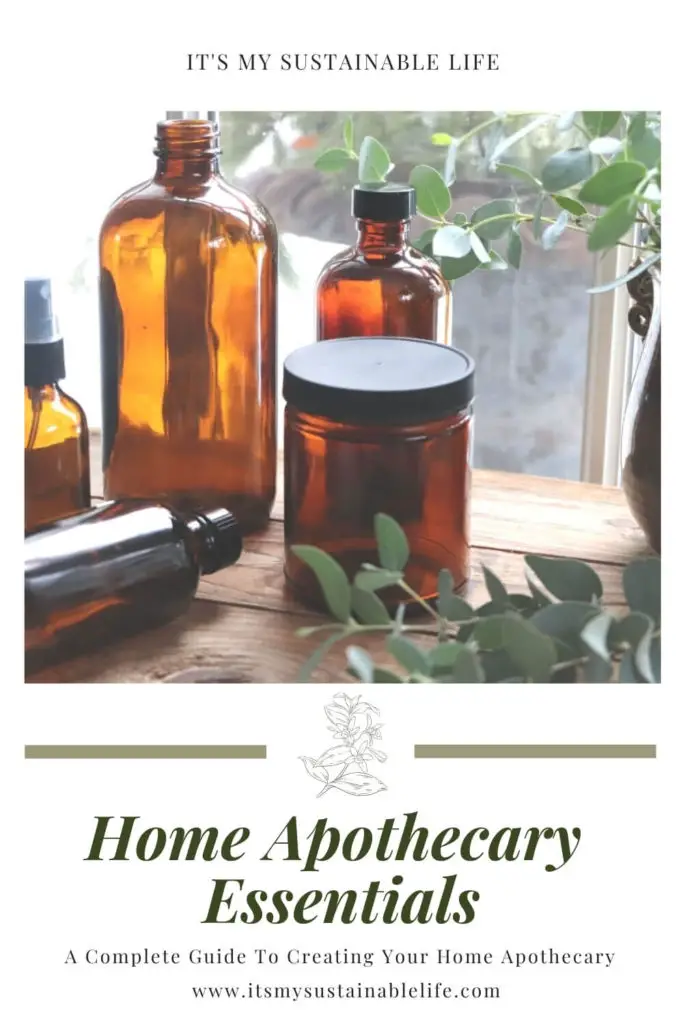
I look to local first. I am blessed to have an herbal store that is well stocked with those items that I cannot provide. If they don’t carry what I’m looking for, I widen my search.
Although your own home apothecary will be filled with the essentials you deem necessary, it may look different than mine aesthetically, one thing is certain. By filling it with the highest quality herbs & ingredients you can possibly afford, you will be rewarded tenfold.
There are many online sources for finding quality herbs. Mountain Rose Herbs and Frontier Co-op are two reliable sources.
What are some of the top herbs that I typically always have on hand? You cannot go wrong when adding these herbs to your home apothecary shelf.
- ECHINACEA – I always like to be well stocked on both echinacea root as well as echinacea leaf, both of which are considered to be immune modulating
- ASTRAGALUS – Considered both an adaptogen and immune modulator, this powerhouse herb has the ability to strengthen the immune system, improve how the body responds to stress, and assists the body in maintaining overall wellness
- DANDELION ROOT | DANDELION FLOWER | DANDELION LEAF – Yup, the stuff you have growing in your yard. Dandelion is what I consider a powerful weed. Dandelion is a bitter herb (making is an excellent herb to increase bile secretions, helping to improve hormonal health & digestion. In addition, I love to use dandelion in my balms & salves.
“Dandelion is used widely for everything from detoxification & cleansing the blood to treating common ailments such as loss of appetite, headaches, and weight loss, to name just a few. The oil made from the dandelion flower (an infusion) is known for its pain relieving qualities (anodyne) as well as it’s moisturizing (emollient) benefits.”
IMSL
- TULSI – Tusli, aka, Holy Basil is an incredible adaptogenic herb that has been used in Ayurvedic medicine for centuries. It’s a supportive herb, helping to uplift & calm the mind, & assists with poor cicurculatory issues
- NETTLE – Nettles may be a pain when touched in the garden, but once dried becomes an herb known for its anti-inflammatory properties as well as its nutritive. Nettle makes an excellent herb for herbal infusion to nourish the adrenal system and kidneys
- YARROW – Specifically white yarrow, is grown prolifically here on the hill. I utilize this herb for its anti-inflammatory properties by making tinctures for use in hand-sanitizers & taking for immune support, as well as its anti-bacterial properties. Think for use on scrapes & bruises
- ELDERBERRY – One of my absolute favorite herbs to grow & use here on the hill. Elderberry is packed with anti-viral actions & is highly nutritive
- PEPPERMINT – Peppermint is easy to grow in pots or the garden, and to harvest, & dry. This herb’s carminative & nutritive properties make it a wonderful choice for calming the digestive system.
There you have it! My suggestions, tips, and guide to creating an organized, functional home apothecary filled with all the essentials you may need to begin creating your own homemade, holistic concoctions for you & your family.
Are you feeling a little kitchen whitchery coming on?
Love, Light, & Laughter ~

Enjoy this article? Please consider sharing it on your favorite social media channel! Want more? Subscribe below for the occasional update with all the “happenings on the hill”!
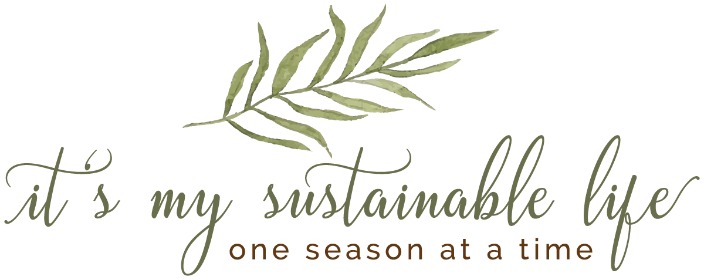
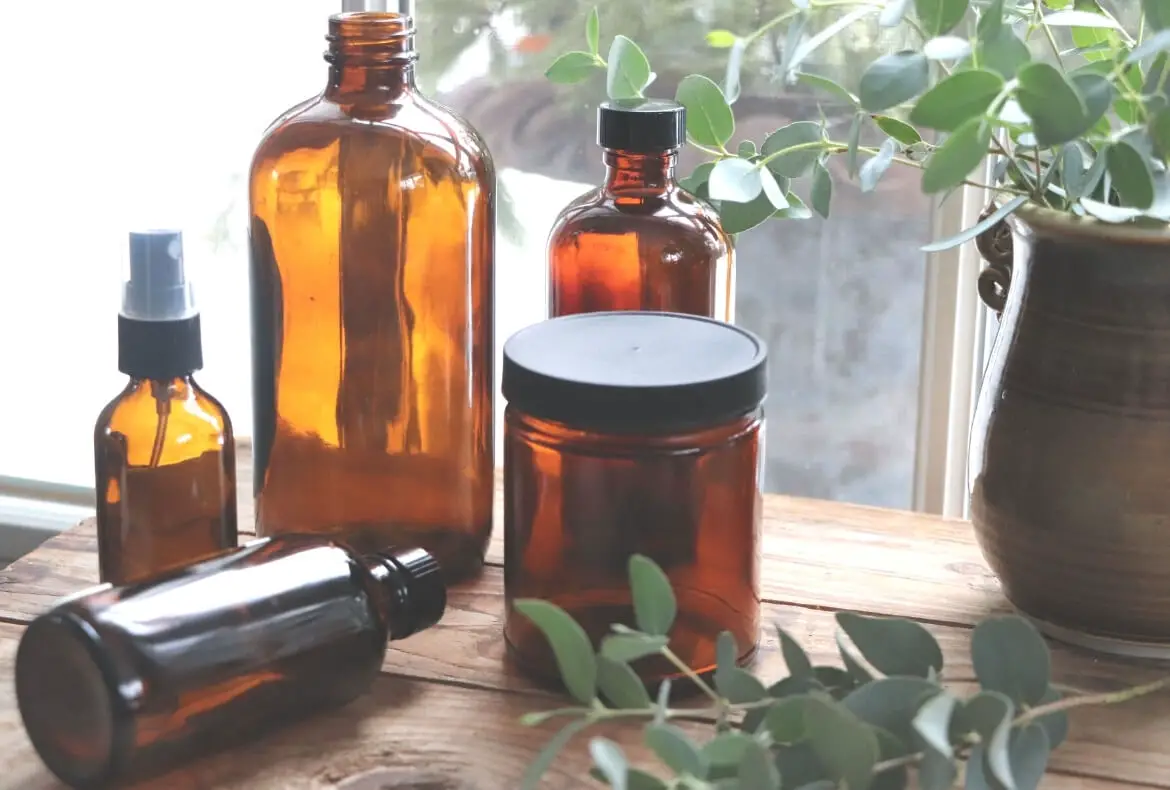

34 comments
Thank you for this. I recently did over 40 years deferred maintenance on my 1945 home. When completed, I will be using a ‘storage’ upstairs bedroom for my workspace, and have planned to take my 8 very tall bookcases filled with my herbs, and my spare closet full of oil, carriers, hydrosols, etc up there as well. With an old wooden dining table, and my utensils for my concoctions, stick blender, dehydrator, etc, I should be all set to go! I can’t wait! Maybe one of the bloggers I follow would allow me to do a guest post on it….who knows?
Sounds like you are going to have an amazing space, Carol! I look forward to seeing it!
Thanks for stopping by the Homestead Blog Hop, your post has been chosen as one of our features for Hop #321!
I love using herbs and natural plants for medicinal treatments. I’ll be checking out your shop for sure!
What a lot of great information! I am just beginning to learn more about these kinds of natural remedies. Thanks for sharing.
What a comprehensive, thorough list! Such a great resource for people starting their own home apothecary.
Congrats! What a fun new adventure!
Wow, I don’t know where you find the time to do everything but you are amazing!
Sometimes in a fog, lol. I have help for sure! I appreciate you reading!
What great information! I wish I had room for a wellness cupboard – but might be able to hold a few things around here!
What a labor of love to create these amazing home remedies and essentials. Thanks for your thoroughness in explaining all that is involved. Congrats on your Etsy shop too!
Thank you, Kendra! Hope you can check it out!
This is amazing! I am dipping my toe into canning and fermenting and hope to one day move on to this!
Oh that’s exciting for you! Be sure to check my site for how to prepare for canning season, water bath canning for beginners, and how to ferment in mason jars!
Life goals!
Wow this is incredible! This is such a thorough overview! I just learned so much!
I find this seriously fascinating! I am compelled to buy a basic starting book and at least try to start learning! A simple few easy remedies. I would guess being mentored by someone knowledgeable would be intriguing!
Keep an eye out Barbara for further topics on learning the basics here! Happy you enjoyed the article!
What an interesting read! I had no idea how much work goes into having a home apothecary! Your cupboard looks amazing, btw!
Thank you!
This post is chock full of information! We don’t use any herbicides, so we end up with a lot of dandelions in the spring that I dig up by hand. I’ll have to look into uses for them instead of just tossing them over our back hill!
Yes! Be sure to read Dandelion Salve And Its Many Uses for more information on dandelions and the many benefits of this wonderful weed!
Love your old scale. That is a wealth of herbal knowledge. I’ve been gardening for years, and a lot of this was new to me.
I love this. I just added Elderberry to my small and meager food forest I am starting. Thanks for the tips!
Wow, this is a spectacular website for learning more about natural self-care. I love it!
Thank you, Michelle! It is a passion of mine!
Tons of info right here. I’ve definitely wanted to get more into home Apothecary myself. Echinacea is one of my fav immune boosters!
It is an amazing herb!
Wow! I had not thought to do this. Great information, and I might need some home apothecary fun. Thanks.
We’ve been getting into herbal remedies since Covid! I think its essential thanks for sharing
Great tips and advice! Everyone should have at least a small cupboard set up and this makes it so much easier, even though a lot of work, so worth it! Thank you for sharing your insight!
I love how you set up your wellness cupboard! So organized and it looks great! Thanks for this informative post. I think it’s a great idea to have these herbs and tinctures on hand!
Wow, I had no idea how much work went into this organization process.
Great read and so very interesting.